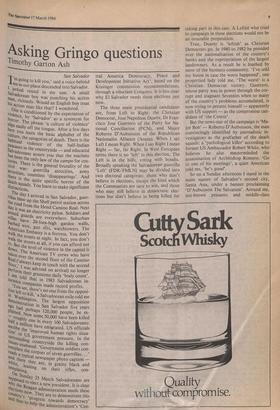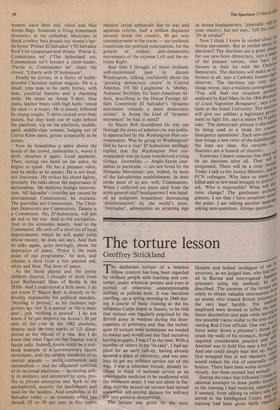Asking Gringo questions
Timothy Garton Ash
San Salvador San Salvador
I'm going to kill you,' said a voice behind me as our plane descended into Salvador.
I jerked round in my seat. A small SalvadOrean boy was punching his action Man, viciously, Would an English boy treat his action man like that? I wondered.
One is conditioned by the expectation of violence, by 'Salvador' as a synonym for sl h.orror. The phrase 'a culture of violence' iPs easily off the tongue. After a few days hee You learn the basic alphabet of the ereure, the categories of death. There is the habitual violence- of the half-Indian Peasants in the countryside — and educated Salvadoreans assure you that the machete has been the only law of the campo for cen- turies. There is the general brutality of the civil war: guerrilla
atro atrocities, army cities, countless 'clisappearings'. And there d is the quite specific horror of the distineath c squads. You learn to make significant tions. The day I arrived in San Salvador, guer- the
rillas blew up the Shell petrol station across road from the Hotel Camino Real. Next day it was an electricity pylon. Soldiers and villas
anted gua ry
rds are everywhere. Suburban have 20-foot-high garden walls,
barbed wire, gun slits, watchtowers. The American Embassy is a fortress. You don't walk the streets at night. In fact, you don't walk the streets at all, if you can afford not
dle. But the level of violence in the capital is own. The American TV crews who have haken
al the second floor of the Camino ,. ("always keep in touch with the second floor,' I was advised on arrival) no longer Perform their gruesome daily 'body count'.
arq told that in 1983 Salvadorean in- surance companies made record profits. YOU see, there's no one from the opposi- inn left to kill,' a Salvadorean exile told me demonstration in San Salvador fie year aga,000 people,v he ex-
s Ploainhedd Perhaps 120.
OUghly Now some 50,000 have been killed r one in every 100 Salvadoreans: :ad. a million have emigrated. US officials 4,.scribe the 'improved human rights situa- tion' to US government pressure. In the tsurrounding countryside the killing con- teinues unabated. 'Government soldiers con- reMplate the corpses of seven guerrillas.. • _.a';Is a typical newspaper photo caption — awnhait there they are, in grainy black and
e, leaning on their rifles, con-
teMPlating. _C)n Sunday 25 March Salvadoreans are 44)Posed to elect a new president. It is clear el .the Reagan administration needs these country snow, They are to demonstrate this andilttrY's "progress towards democracy' taus to
Help the administration's `Cen- tral America Democracy, Peace and Development Initiative Act', based on the Kissinger commission recommendations, through a reluctant Congress. It is less clear why El Salvador needs these elections just now.
The three main presidential candidates are, from Left to Right: the Christian Democrat, Jose Napoleon Duarte, Dr Fran- cisco Jose Guerrero of the Party for Na- tional Conciliation (PCN), and Major Roberto D'Aubuisson of the Republican Nationalist Alliance (Arena). When I say Left I mean Right. When I say Right I mean Right — far, far Right. In West European terms there is no 'left' in this election. The Left is in the hills, voting with bombs. Broadly speaking the Salvadorean guerrilla `Left' (FDR/FMLN) may be divided into two electoral categories: those who don't believe in elections, except the kind which the Communists are sure to win, and those who. may still believe in democratic elec- tions but don't believe in being killed for taking part in this one. A Leftist who tried to campaign in these elections would not be an insurable proposition.
True, Duarte is `leftish' as Christian Democrats go. In 1980 to 1982 he presided over the nationalisation of the country's banks and the expropriation of the largest landowners. As a result he is loathed by most of the business community. 'I've sold my house in case the worst happened', one propertied lady told me. 'The worst' is a Christian Democrat victory. Guerrero, whose party was in power through the cor- rupt and stagnant Seventies when so many of the country's problems accumulated, is now trying to present himself — apparently with US support — as the compromise can- didate of 'the Centre'.
But the news-star of the campaign is 'Ma- jor Bob' — Roberto D'Aubuisson, the man convincingly identified by journalistic in- vestigators as the godfather of the death squads: a 'pathological killer' according to former US Ambassador Robert White, who believes he also masterminded the assassination of Archbishop Romero. `Go to one of his meetings', a quiet American told me, 'he's good'.
So on a Sunday afternoon I stand in the main square of Salvador's second city, Santa Ana, under a banner proclaiming `D'Aubuisson The Salvation'. Around me, nut-brown peasants and middle-class women wave their red, white and blue Arena flags. Someone is firing homemade fireworks, at the cathedral. Musicians in black cowboy hats pound out Arena's bat- tle hymn 'Primer El Salvador' (`El Salvador First') on tympanum and drums. 'Patria si, Comunismo no' (`The fatherland yes, Communism no') intones a cheer-leader, 'Patria si, Comunismo no' chant the crowd. 'Liberty with D'Aubuisson'.
Finally he arrives, in a flurry of bullet- proofed Cherokee station wagons. He is a small, trim man in his early forties, with neat, youthful features and a charming smile. He wears an Arena T-shirt, blue jeans, leather boots with high heels: round his neck — a rosary. He is closely followed by young toughs, T-shirts tucked over their pistols, but they keep out of sight behind the platform. Up on the platform, middle- aged, middle-class women, bulging out of Calvin Klein jeans, gyrate ecstatically as he comes.
Now he brandishes a sabre above the heads of the crowd, unsheathes it, waves it aloft, sheathes it again. Loud applause. Then, resting one hand on the sabre, he begins to speak. He has a pleasant voice, and he smiles as he speaks. He is not loud, not histrionic. He strikes his chord lightly, precisely. He talks about the importance of nationalism. He deplores foreign interven- tion. All Salvador's troubles are caused by international Communism, he explains. The guerrillas are Communists. The Chris- tian Democrats are Communists. Duarte is a Communist. He, D'Aubuisson, will put an end to the war. And to the corruption. And to the economic misery. And to the Communist. He reels off a short list of local improvements which he will make (with whose money, he does not say). And then he talks again, quite movingly, about the imperative of peace. 'Peace is the main point of our programme,' he says, and releases a dove from a box painted red, white and blue. The dove of peace.
As the band played and the pretty children cheered, I thought of shots from Leni Riefenstahl films of Berlin in the 1930s. And I understood a little more. I do not know if 'Major Bob' is directly or in- directly responsible for political murders. `Nothing is proved,' as his business sup- porters say: not 'It is untrue' or 'He is inno- cent', just 'nothing is proved'. I do not know if he can improve on Arena's 29 per cent of the vote in the 1982 elections, despite such obvious marks of US disap- proval as the refusal of a visa. But I do know that what I saw on that Sunday was a fascist rally. Indeed, Arena could be a text- book example of a contemporary fascist movement, with the terrible simplicity of its central appeals — anti-Communism and nationalism — and the calculated cynicism of its sectional platforms — promising safe- ty to mothers, and adventure to sons, pro- fits to private enterprise and work to the unemployed, security for landowners and land for the landless. And conditions in El Salvador today — an economy which has shrunk 25 to 30 per cent in five years, massive social upheavals due to war and agrarian reform, half a million displaced persons inside the country, 40 per cent unemployment in the towns — are textbook conditions for political polarisation, for the growth of violent, anti-democratic movements of the extreme Left and the ex- treme Right.
And then I thought of those civilised, well-intentioned men in distant Washington, talking confidently about the 'growing democratic centre' in Central America. Of Mr Langhorne A. Motley, Assistant Secretary for Inter-American Af- fairs, describing to the House Foreign Af- fairs Committee El Salvador's 'dynamic movement towards a more democratic society'. Is Arena the kind of 'dynamic movement' he had in mind?
As Major Bob shouldered his way out through the press of admirers he was polite- ly approached by the Washington Post cor- respondent. Was he going to Washington? Did he have a visa? D'Aubuisson smilingly replied that the Washington Post cor- respondent was (in loose translation) a lying Gringo. Journalists — Anglo-Saxon jour- nalists in particular — are not loved by the Dynamic Movement: nor, indeed, by most of the Salvadorean establishment. In their terms most of us are, well, Communists. When I collected my press card from the army general staff headquarters I was hand- ed an indignant broadsheet denouncing `disinformation' by the world's press. `Journalist', admonishes an arresting sign The Spectator 17 March OP in Arena headquarters, `journalist sell your country, but not ours. Tell the truth. 'Di la verdad!' Now I think I know la verdad about the Arena movement. But la verdad about til elections? The elections are a great chalice for our new-born democracy, says a leader, of the peasant unions, who have leis thrown in their lot with the airisti6P., Democrats. The elections will make no dos ference at all, says a Catholic human rights observer. The elections can only things worse, says a resident correspondell: 'You will find our situation perfecu.Y analysed by Karl Marx in the I8th Brumaire of Louis Napoleon Bonaparte', says a 'cc; turer at the Jesuit University. The electicni will give our soldiers a legitimate goveir.i!. ment to fight for, says a senior PCN polite' cian. 'The democratic process is discredit by being used as a cloak for counts insurgency operations'. Each new conversal tion brings a new twist of the kaleidoscolr: No lines are clear. No versions tally Statistics are a branch of rhetoric. ll Yesterday I heard rumours that the e wi be no elections after all. They will postponed. There will be a coup ilistie"hids Today I talk to the Justice Minister, ant' el PCN colleague. Why have so manY bicei killed and so few been brought to justice. ask. Who is responsible? What will el n-g; tions change? The gentlemen ex°11tellfj glances. I see that I have somehow MP' e, the point. I am talking another laagag asking non-questions. Gringo questions.















































 Previous page
Previous page